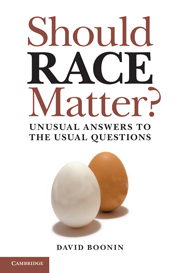Book contents
- Frontmatter
- Contents
- Preface
- 1 Thinking in Black and White
- 2 Repairing the Slave Reparations Debate
- 3 Advancing the Slave Reparations Debate
- 4 One Cheer for Affirmative Action
- 5 Two Cheers for Affirmative Action
- 6 Why I Used to Hate Hate Speech Restrictions
- 7 Why I Still Hate Hate Speech Restrictions
- 8 How to Stop Worrying and Learn to Love Hate Crime Laws
- 9 How to Keep on Loving Hate Crime Laws
- 10 Is Racial Profiling Irrational?
- 11 Is Racial Profiling Immoral?
- Notes
- Sources
- Index
4 - One Cheer for Affirmative Action
Why There’s Nothing Wrong with Abandoning Racial Preferences
Published online by Cambridge University Press: 05 June 2012
- Frontmatter
- Contents
- Preface
- 1 Thinking in Black and White
- 2 Repairing the Slave Reparations Debate
- 3 Advancing the Slave Reparations Debate
- 4 One Cheer for Affirmative Action
- 5 Two Cheers for Affirmative Action
- 6 Why I Used to Hate Hate Speech Restrictions
- 7 Why I Still Hate Hate Speech Restrictions
- 8 How to Stop Worrying and Learn to Love Hate Crime Laws
- 9 How to Keep on Loving Hate Crime Laws
- 10 Is Racial Profiling Irrational?
- 11 Is Racial Profiling Immoral?
- Notes
- Sources
- Index
Summary
A white candidate and a black candidate submit an application for a position. Both want to be admitted to the same university, hired at the same automobile plant, or promoted from their current jobs within the same police department. Both candidates are suitably qualified for the position. If either of them were the only one to submit an application, the organization in question would offer the position to that candidate without hesitation. The white applicant, though, is at least a little bit better qualified than the black applicant. His grades and test scores are a little bit higher, he has slightly stronger letters of recommendation, or he has a little bit more experience on the job. If the organization didn’t know the race of either of the applicants, it would select the white applicant over the black applicant for this reason. But the organization does know the race of both applicants. And it has a policy that leads it to select the black applicant over the white applicant, despite the fact that the white applicant is at least a little bit better qualified, precisely because the white applicant is white and the black applicant is black.
Supporters of policies that give an advantage to black applicants over white applicants in this way tend to refer to such policies as a form of “affirmative action.” It’s hard to oppose taking action that’s “affirmative,” after all, without sounding, well, negative. Opponents of such policies, on the other hand, tend to refer to them as “racial preferences”. If the advantage that’s given to black candidates over white candidates is merely a matter of “preference” after all, rather than of sound moral reasoning, then such policies seem to be simply a matter of imposing one’s whim on others, like insisting that since you prefer chocolate ice cream to vanilla, everyone else should, too. I’m not particularly fond of either label. Something like “race-based prioritization” strikes me as a more accurate and less question-begging term to use. I’ll mostly stick with the term “affirmative action” in this chapter and the chapter that follows, though, since that’s the closest thing we have to an official title.
- Type
- Chapter
- Information
- Should Race Matter?Unusual Answers to the Usual Questions, pp. 135 - 174Publisher: Cambridge University PressPrint publication year: 2011



